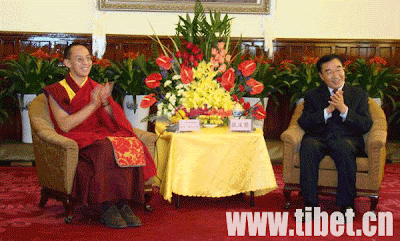Mr. Zhu Weiqun, the Executive Vice Minister of the United Front Work Department of the CPC Central Committee who has been negotiating with the Dalai Lama's Envoys says that the Party and its officials should not believe in Religion.
This is good news.
In the past the Party has often interfered with the management of the monasteries and the selection of the reincarnated Lamas in Tibet.
The Communist leaders should also stop using 'their' Panchen Lama. On this picture one sees, former Tibet's Party boss Zhang Qingli with Beijing's Panchen Lama.
The Party should continue to use of its dialectical materialism view of the world and forget about Religion, a poison according to Mao.
CPC members shall not believe in religion: senior official
Catherine Liu
Xinhua
December 20, 2011
Members of the Communist Party of China (CPC) shall not believe in religion, which is a principle to be unswervingly adhered to, a senior official has said.
The Party would suffer "pernicious" consequences if members are allowed to believe in religion, said Zhu Weiqun, executive vice minister of the United Front Work Department of the CPC Central Committee.
"Party organizations will be greatly weakened in the fight against separatism, as hostile forces home and abroad are doing what they can to use religion for their separatist activities in the areas inhabited by ethnic groups," said Zhu in an article published in Qiushi, or "Seeking Truth," the biweekly official journal of the CPC Central Committee.
Zhu slammed the growing occurrences of CPC members participating in religious activities, establishing close contacts with religious figures and some members becoming de facto religious believers.
Some people, even within the Party, have said the ban of CPC members believing in religion should be lifted. They listed the "reasons and benefits" for CPC members to believe in religion, and even argue the ban was inconsistent with the Constitution, Zhu said.
"If the Party lifts the ban as some people suggest, it can hardly see the promised benefits and will instead suffer obvious pernicious consequences," Zhu said in the article.
The CPC's use of Marxism and all its theories, ideas and actions as a guide is based on the dialectical materialism view of the world, Zhu noted.
The Party will be divided ideologically and theoretically if members are allowed to believe in religion, as it means the coexistence of both idealism and materialism and of both theism and atheism, compromising the guiding role of Marxism.
This is good news.
In the past the Party has often interfered with the management of the monasteries and the selection of the reincarnated Lamas in Tibet.
The Communist leaders should also stop using 'their' Panchen Lama. On this picture one sees, former Tibet's Party boss Zhang Qingli with Beijing's Panchen Lama.
The Party should continue to use of its dialectical materialism view of the world and forget about Religion, a poison according to Mao.
CPC members shall not believe in religion: senior official
Catherine Liu
Xinhua
December 20, 2011
Members of the Communist Party of China (CPC) shall not believe in religion, which is a principle to be unswervingly adhered to, a senior official has said.
The Party would suffer "pernicious" consequences if members are allowed to believe in religion, said Zhu Weiqun, executive vice minister of the United Front Work Department of the CPC Central Committee.
"Party organizations will be greatly weakened in the fight against separatism, as hostile forces home and abroad are doing what they can to use religion for their separatist activities in the areas inhabited by ethnic groups," said Zhu in an article published in Qiushi, or "Seeking Truth," the biweekly official journal of the CPC Central Committee.
Zhu slammed the growing occurrences of CPC members participating in religious activities, establishing close contacts with religious figures and some members becoming de facto religious believers.
Some people, even within the Party, have said the ban of CPC members believing in religion should be lifted. They listed the "reasons and benefits" for CPC members to believe in religion, and even argue the ban was inconsistent with the Constitution, Zhu said.
"If the Party lifts the ban as some people suggest, it can hardly see the promised benefits and will instead suffer obvious pernicious consequences," Zhu said in the article.
The CPC's use of Marxism and all its theories, ideas and actions as a guide is based on the dialectical materialism view of the world, Zhu noted.
The Party will be divided ideologically and theoretically if members are allowed to believe in religion, as it means the coexistence of both idealism and materialism and of both theism and atheism, compromising the guiding role of Marxism.

No comments:
Post a Comment